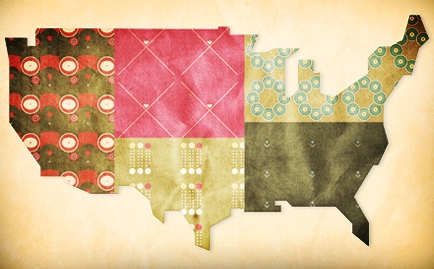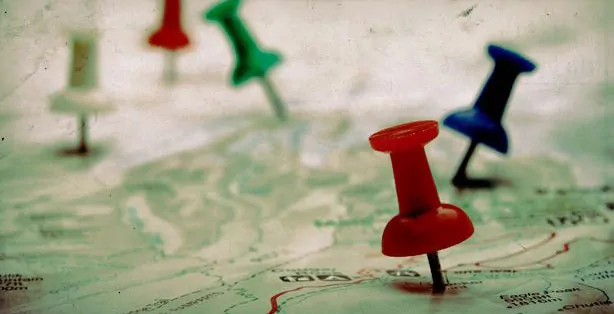
How could I know what I would lose that summer I left home, setting out for the rising sun, the dusty Arizona highway at my back? My family knew: I would lose them in the small moments of day-to-day life, strung together like costly pearls—those moments that allow you to forget yourself, and rest in the assurance of being truly known.
By fall I realized there are a million little things you lose in leaving. And winter—when thoughts turn to holidays and childhood memories of decorations and tables set with food—makes the longing even more acute. Down to the very roads we drive, the places we eat, the schools and parks that frame our childhood—with each one goes fragments of answers that, before, went taken for granted. Questions of identity, purpose and importance to the greater world—it’s just as the author Wendell Berry said: “If you don’t know where you are, you don’t know who you are.” But if the good life is to be found in staying put, why are we so quick to leave? Why the itchy feet?
From a young age, we’re taught that leaving is a necessity of sorts. Some of us leave for education, others for fortune, some to escape. It’s how we make more money, or find romance. Leaving, it seems, is often the answer to the stagnation we feel—the boredom or lack of opportunity that looms like some bleak sky in the future. It’s easier to do than face the broken parts of our lives, failures too big to be forgotten and wrongs too great to be forgiven. But none of this is entirely our fault. For those of us Americans, leaving is in our blood.
Looking back at the early American settlers, we see the leaving spirit at its best. For many, it was a chance for a promise-filled future. Full of adventure and discovery, they blazed new paths to the new frontier. This propensity toward exploration, adventure and novelty still flows through our collective veins.
But there’s something we need to remember about those early settlers: They moved on to do just that, settle. Theirs was a search for a sense of place, somewhere to call home—to live, die and pass on through the generations. Once they found it, they did anything required to stay.
But today we live with a different reality. Forward motion and progress are tantamount to virtue. It’s a value we see reflected in technology, the clothes we wear, the importance we ascribe to history and tradition. In The Sense of Place, author Wallace Stegner writes, “Adventurous, restless, seeking, asocial or antisocial, the displaced American persists by the million, long after the frontier has vanished. He exists to some extent in all of us, the inevitable by-product of our history: the New World transient.”
One of the problems with such devotion to movement is that stillness, by default, amounts to failure. Don’t we see those people who stay close to home, away from the universities and the big cities, as unmotivated, lacking vision and initiative? Berry and Stegner suggest the opposite. The greater failure belongs to the one always in search of something new, committed to little more than an appetite for novelty.
Sense of place is better defined by the neighborhood streets and alleyways you first explored on bicycle than by any dictionary. It’s the tree that housed your fort, the schoolyard where you first felt the sting of love; it’s where you learned to drive, where the beauty of the land surrounding you went unnoticed until you had moved away and come home again several times, finally seeing it anew; it’s the people who shaped you for better or worse; it’s the soil of your imagination where the roots of your memory go deeper than you know or care to remember.
“I was born on wheels,” Stegner writes. “I know about the excitement of newness and possibility, but I also know the dissatisfaction and hunger that result from placelessness. Some towns that we lived in were never real to me. They were only the raw materials of places, as I was the raw material of a person. Neither place nor I had a chance of being anything unless we could live together for a while.”
Stegner’s experience reveals an important truth about place: Our sense of it very much depends on the amount of time we give to staying put, knowing and learning our place and the people it sustains. It directly corresponds to our peace of mind, joy and happiness. Stegner suggests that wholeness as a human being depends on it.
In his essay “The Work of Local Culture,” Wendell Berry writes, “How can [members of a community] know one another if they have forgotten or have never learned one another’s stories? If they don’t know one another’s stories, how can they know whether or not to trust one another? People who do not trust one another do not help one another, and moreover they fear one another.”
Nowhere is this felt more acutely for the Christian than the local church. Sadly, fewer Americans today have what they call a church home, and so the Church at large suffers greatly—the Gospel doesn’t get boldly displayed to the local, national and international communities. There’s a vast shortage of placed individuals sitting in its pews, people committed to service of the local body and surrounding community. So, our churches can feel less like homes and more like visitor centers where loving one another is difficult because we don’t know each other. The displaced person lives a temporary lifestyle and finds little reason to cultivate meaningful relationships. He does this because he knows that soon, he’ll move on to the next location. Why get attached now?
As we wander from church to church, we are increasingly cut off from this thing we deeply need: a spiritual home, a body of believers we share life with. It’s this connection that gives us not only identity but purpose. It’s how we discover calling and find fulfillment in the gifts God gives us. The hard truth for many outward-focused believers is that while God does call His people to other places, He also gives gifts for the time and place we find ourselves in. He wants us to love our place and to cultivate the life of His Kingdom within it. The wholeness of our community depends on it. And we depend on the wholeness of our community.
Of course, this discussion would be incomplete without acknowledging that sometimes, God calls us to leave. But we need to acknowledge leaving is serious business, to be undertaken soberly and through prayer. When God led me from my home, I didn’t realize how much I would lose in following Him. But now, as the sun sets over the west, I imagine my family as they head home from work, eat dinner and laugh together. And though in my new home I’ve recovered some of my losses, these moments will always remain as losses. I feel them in every phone call, letter and holiday.
So what does this mean for you? Perhaps you need to ask yourself: Are you willing? Are you willing to stay, if that’s what God has for you? Wherever God has you, wherever He leads, give yourself to knowing the place and belong to it; love and serve it. It’s hard work. But if you’ll be fully present where you are, in all you do, you just might find what you’ve been looking for all along.





















